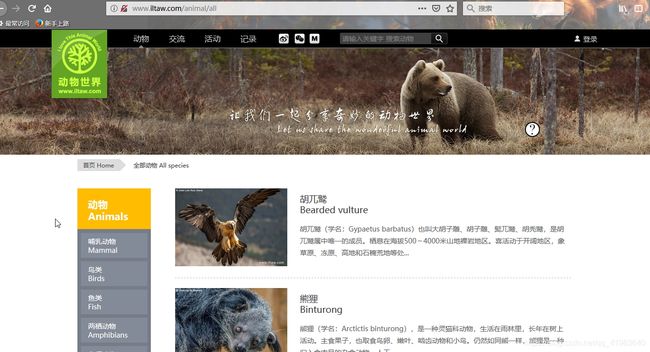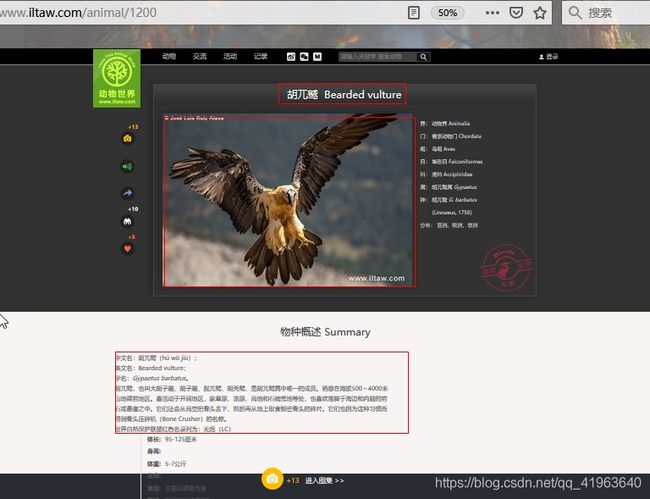scrapy爬取图片并保存在不同的文件夹下
文章目录
- 1、爬取的网站
- 2、创建项目和爬虫模块
- 3、settings.py配置爬虫的配置信息
- 4、animal.py主要是通过xpath获取页面的信息
- 5、items.py定义属性字段
- 6、pipelines.py模块,处理animal.py传递过来的信息,将信息和图片保存在对应的位置
- 7、在项目的根目录下创建批处理文件animal.bat,方便快速执行命令
- 8、在项目的根目录中执行批处理文件
1、爬取的网站
http://www.iltaw.com/animal/all

 这里主要爬取的是动物详情页的信息,有三个信息字段,动物名、动物图片、动物概述
这里主要爬取的是动物详情页的信息,有三个信息字段,动物名、动物图片、动物概述
第一层页面主要是获取动物详情页的链接
2、创建项目和爬虫模块
创建项目
scrapy startproject animalspider
创建爬虫模块
scrapy genspider animal http://www.iltaw.com
3、settings.py配置爬虫的配置信息
# -*- coding: utf-8 -*-
# Scrapy settings for animalspider project
#
# For simplicity, this file contains only settings considered important or
# commonly used. You can find more settings consulting the documentation:
#
# https://doc.scrapy.org/en/latest/topics/settings.html
# https://doc.scrapy.org/en/latest/topics/downloader-middleware.html
# https://doc.scrapy.org/en/latest/topics/spider-middleware.html
BOT_NAME = 'animalspider'
SPIDER_MODULES = ['animalspider.spiders']
NEWSPIDER_MODULE = 'animalspider.spiders'
# Crawl responsibly by identifying yourself (and your website) on the user-agent
#USER_AGENT = 'animalspider (+http://www.yourdomain.com)'
# Obey robots.txt rules
# 不遵守robots协议
ROBOTSTXT_OBEY = False
# Configure maximum concurrent requests performed by Scrapy (default: 16)
#CONCURRENT_REQUESTS = 32
# Configure a delay for requests for the same website (default: 0)
# See https://doc.scrapy.org/en/latest/topics/settings.html#download-delay
# See also autothrottle settings and docs
# 爬取时间间隔
DOWNLOAD_DELAY = 2
# The download delay setting will honor only one of:
#CONCURRENT_REQUESTS_PER_DOMAIN = 16
#CONCURRENT_REQUESTS_PER_IP = 16
# Disable cookies (enabled by default)
#COOKIES_ENABLED = False
# Disable Telnet Console (enabled by default)
#TELNETCONSOLE_ENABLED = False
# Override the default request headers:
# 定义headers的基础信息
# 防止服务器不让访问
DEFAULT_REQUEST_HEADERS = {
# 'Accept': 'text/html,application/xhtml+xml,application/xml;q=0.9,*/*;q=0.8',
# 'Accept-Language': 'en',
'User-agent': 'Mozilla/5.0 (Linux; U; Android 2.3.7; en-us; Nexus One Build/FRF91) AppleWebKit/533.1 (KHTML, like Gecko) Version/4.0 Mobile Safari/533.1',
}
# Enable or disable spider middlewares
# See https://doc.scrapy.org/en/latest/topics/spider-middleware.html
#SPIDER_MIDDLEWARES = {
# 'animalspider.middlewares.AnimalspiderSpiderMiddleware': 543,
#}
# Enable or disable downloader middlewares
# See https://doc.scrapy.org/en/latest/topics/downloader-middleware.html
#DOWNLOADER_MIDDLEWARES = {
# 'animalspider.middlewares.AnimalspiderDownloaderMiddleware': 543,
#}
# Enable or disable extensions
# See https://doc.scrapy.org/en/latest/topics/extensions.html
#EXTENSIONS = {
# 'scrapy.extensions.telnet.TelnetConsole': None,
#}
# Configure item pipelines
# See https://doc.scrapy.org/en/latest/topics/item-pipeline.html
# item管道模块执行
ITEM_PIPELINES = {
'animalspider.pipelines.AnimalspiderPipeline': 300,
'animalspider.pipelines.ImagesspiderPipeline': 400,
}
# # 定义图片的保存路径
IMAGES_STORE = 'animal'
# 定义接受图片的变量
IMAGES_URLS_FIELD = 'img_url'
# Enable and configure the AutoThrottle extension (disabled by default)
# See https://doc.scrapy.org/en/latest/topics/autothrottle.html
#AUTOTHROTTLE_ENABLED = True
# The initial download delay
#AUTOTHROTTLE_START_DELAY = 5
# The maximum download delay to be set in case of high latencies
#AUTOTHROTTLE_MAX_DELAY = 60
# The average number of requests Scrapy should be sending in parallel to
# each remote server
#AUTOTHROTTLE_TARGET_CONCURRENCY = 1.0
# Enable showing throttling stats for every response received:
#AUTOTHROTTLE_DEBUG = False
# Enable and configure HTTP caching (disabled by default)
# See https://doc.scrapy.org/en/latest/topics/downloader-middleware.html#httpcache-middleware-settings
#HTTPCACHE_ENABLED = True
#HTTPCACHE_EXPIRATION_SECS = 0
#HTTPCACHE_DIR = 'httpcache'
#HTTPCACHE_IGNORE_HTTP_CODES = []
#HTTPCACHE_STORAGE = 'scrapy.extensions.httpcache.FilesystemCacheStorage'
4、animal.py主要是通过xpath获取页面的信息
# -*- coding: utf-8 -*-
import scrapy
from scrapy import Request
from scrapy.linkextractors import LinkExtractor
from scrapy.spiders import CrawlSpider, Rule
from ..items import AnimalspiderItem
class AnimalSpider(CrawlSpider):
name = 'animal'
allowed_domains = ['www.iltaw.com']
start_urls = ['http://www.iltaw.com/animal/all']
# 先调用scrapy的爬虫框架模板,获取所有分页的页面,后续的页面交给回调函数处理
rules = (
Rule(LinkExtractor(allow=r'page'), callback='my_parse', follow=True),
)
# 获取第一层页面的所有等物链接,
def my_parse(self, response):
# print("++++++++++++++++++", response.url)
selsectList = response.xpath('/html/body/div[1]/div/div[3]/div/div[2]/ul/li/div[2]/h3/a/@href')
for url in selsectList.extract():
yield Request(url, callback=self.parse_animal)
# 第二层页面处理,获取想要的信息
def parse_animal(self, response):
# 调用items()的类
animal = AnimalspiderItem()
name = response.xpath('/html/body/div[1]/div/div[2]/div/div[2]/h3/text()').extract()[0]
img_url = response.xpath('//div[@class="img"]/img/@data-url').extract()[0]
xixin = "".join(response.xpath('/html/body/div[1]/div/div[4]/div/div[2]/text()').extract())
# print("+++++++++++++++++++",name,img_url,xixin)
animal['name'] = name
animal['img_url'] = img_url
animal['xixin'] = xixin
return animal
5、items.py定义属性字段
# -*- coding: utf-8 -*-
import scrapy
class AnimalspiderItem(scrapy.Item):
# 动物名
name = scrapy.Field()
# 动物图片链接
img_url = scrapy.Field()
# 动物介绍
xixin = scrapy.Field()
6、pipelines.py模块,处理animal.py传递过来的信息,将信息和图片保存在对应的位置
# -*- coding: utf-8 -*-
# Define your item pipelines here
#
# Don't forget to add your pipeline to the ITEM_PIPELINES setting
# See: https://doc.scrapy.org/en/latest/topics/item-pipeline.html
import os
from scrapy.pipelines.images import ImagesPipeline # 下载图片的管道
from scrapy.spiders import Request
class AnimalspiderPipeline(object):
def create_dir(self, path):
'''
创建文件夹
:return:
'''
# 去除首位空格
path = path.strip()
# 去除尾部 \ 符号
path = path.rstrip("\\")
# 判断路径是否存在
isExists = os.path.exists(path)
# 判断结果
if not isExists:
# 如果不存在则创建目录
# 创建目录操作函数
os.makedirs(path)
print(path + ' 创建成功')
return True
else:
# 如果目录存在则不创建,并提示目录已存在
print(path + ' 目录已存在')
return False
def process_item(self, item, spider):
'''将不同的动物保存成不同的文件夹'''
# 动物名字的文件夹
apath = "./animal/" + item["name"]
# 动物名字的文件
wenjian = apath + "/" + item["name"] + '.txt'
self.create_dir(apath)
with open(wenjian, 'wb') as file:
file.write((item['name'] + "," + item['xixin'] + '\n').encode('utf-8'))
return item
class ImagesspiderPipeline(ImagesPipeline):
def get_media_requests(self, item, info):
'''获取图片的url,通过Request方法,保存图片'''
# 这里meta={'item': item},目的事件item传递到file_path中
return Request(item['img_url'], meta={'item': item})
def file_path(self, request, response=None, info=None):
'''图片保存的路径'''
item = request.meta['item']
#
apath = "./" + item["name"]
img_name= item["name"]
path = apath + '/' + img_name + '.jpg'
print("图片路径+++++++++++++", path)
return path
7、在项目的根目录下创建批处理文件animal.bat,方便快速执行命令
scrapy crawl animal

